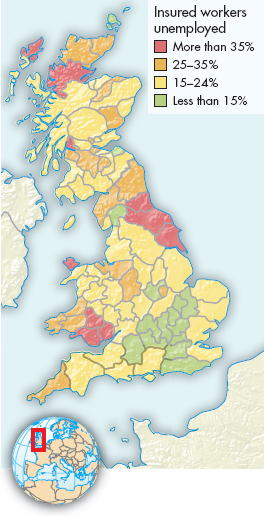The lack of large-scale government spending contributed to the rise of mass unemployment. The financial crisis led to production cuts; as a result, workers lost their jobs and had little money to buy goods (see Map 26.1). Mass unemployment created great social problems. Poverty increased dramatically, although in most countries unemployed workers generally received some kind of meager unemployment benefits or public aid that prevented starvation. Millions of people lost their spirit, condemned to an apparently hopeless search for work. Homes and ways of life were disrupted in millions of personal tragedies. Young people postponed marriages, and birthrates fell sharply. There was an increase in suicide and mental illness. Poverty or the threat of poverty became a grinding reality. Only strong government action could deal with mass unemployment, a social powder keg preparing to explode.

